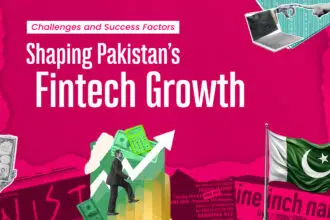Forget the instant success stories you see on TikTok. The real journey to building a billion-dollar company is messy, exhausting, and often involves months & years on a failed idea. That was the starting point for Mahmoud Arram, Co-Founder and former CTO of Bluecore, an Egyptian entrepreneur who mastered the B2B tech game, hit unicorn status, and is now attempting to revolutionize AI commerce.
Mahmoud’s story began in the structured world of corporate America, which felt stifling. He realized he was expected to “تأدي وظيفه معينه وبس” (perform a specific job and that’s it). He discovered a another world or parallel world in the startup scene—a world where they wore t-shirts, not shirts and pants, and where a smaller company allowed him to achieve myself more. In 2007, alongside his friend Fayez Mahmoud, he launched his first venture, Spontaneity, a social application focused on planning outings. For four long years, they kept their day jobs, working only on “nights and weekends” after their full-time schedules, a grind that, as Mahmoud Arram recounts, meant their social lives were destroyed. He emphasized that working on the side means you don’t fail fast; it took them nearly five years to realize the app had “structural problems”. They applied to the prestigious Y Combinator accelerator twice and were rejected both times. The failure was brutal; he said they felt they had wasted their lives.
For many entrepreneurs launching in the Arab / MENAP world, the first step is often the biggest hurdle. The experience of Mahmoud Arram, Co-Founder and former CTO of Bluecore, shows that delaying commitment—working only on nights and weekends—slows the inevitable failure and prevents the quick pivots necessary to find Product Market Fit (PMF). If 90% of MENA startups never reach $1 million, the failure point isn’t lack of ideas, but lack of aggressive, full-time dedication to diagnosing and solving structural problems.
The “Magical Box” That Made Customers “Crazy Money”
The pivot moment arrived when Mahmoud Arram was preparing to marry. Where he have a window now to try again before having kids. “Go for it” His partner pushed. Inspired, he and Fayez resigned, committing to working without salary for a year and a half, and made a crucial decision: to abandon consumer apps and build B2B software for businesses. The genesis of Bluecore came from a realization he had while working at an expensive e-commerce fashion company – the biggest cost was marketing, and customers retention relied on sending the same “batch and blast” email to everyone. The brilliant, simple solution was personalization—tailoring every email to the individual, featuring products they had viewed or were likely to buy. Bluecore’s pitch was simple: “You don’t need to do anything. Just put a piece of JavaScript on your site, and we have a ‘magical box’ that will handle everything”. This process got customers live and making money in just two weeks, drastically speeding up integration compared to competitors. Even though the initial product was stupid—it only showed users the items they had just looked at—Mahmoud laughed as he shared that their customers were making crazy money just from people clicking the emails. This confirmed their PMF, which he humbly credited to “luck and God’s grace” after the failure of his first venture.
Mahmoud ‘s success with Bluecore stemmed from solving a specific, intense customer pain point. When scaling, he later learned that you must sell aspirin because customers are experiencing a headache and need immediate relief, rather than selling a “vitamin”. This intense focus on a critical, demonstrable value (making customers crazy money) is the core foundation for achieving PMF. Furthermore, early success can lead to overconfidence: Mahmoud emphasized that a major mistake was the “product trap”. They diverted their best engineers to build a second product instead of focusing intensely on the core product line that had already achieved PMF, wasting significant time and effort.
Scaling Bluecore presented predictable “patterns” or energy fields surrounding the revenue milestones. The shift from $1 million to $10 million was difficult, requiring significant investment in processes. This stage, he explained, involves dealing with continuous fires, such as poor Quality Assurance (QA) or the need to make sales training consistent (Sales Enablement). Mahmoud Arram personally faced the challenge of shifting from an “individual contributor” (engineer writing code) to an administrative manager, a transition that he found very difficult because, as a manager, “it’s very difficult to see the result of your work quickly”. To ensure long-term stability and high performance, he developed a core philosophy around hiring. He emphasized that founders need to bring in people smarter than themselves.
He stressed the importance of humility and self-awareness, urging founders to know their own weaknesses. Mahmoud Arram said, “May God have mercy on a man who knew his own worth”, underscoring the necessity of hiring people who complete the shortcomings you have. Scaling past the $40 million revenue barrier required perfect execution, meaning the early managers who were great individual performers often had to be replaced by seasoned executive hires who specialized in managing people, recruitment, and forecasting.
As startups grow in the region, founder ego and a lack of humility can stall scaling. Mahmoud Arram’s experience highlights that the skills that make a founder a brilliant engineer or individual contributor are not the same skills needed to be a good manager. Founders must recognize that past the $10 million and $40 million marks, they need to prioritize strategic hiring, explicitly bringing in experts—whether in sales, finance, or engineering—who are smarter and more specialized than the founders themselves. Furthermore, Mahmoud Arram, Co-Founder and former CTO of Bluecore, learned that founders must stop focusing on small issues and instead apply their unique holistic knowledge to solving cross-functional issues—the sticky problems that sit on the boundaries between multiple teams.
Billion-Dollar , Conquering Imposter Syndrome, and the Audacious Restart with OctoGen
When Bluecore achieved its funding round, crossing the billion-dollar valuation, Mahmoud Arram experienced “احساس مختلط” (mixed emotions). He emphasized the awe and responsibility that comes when people trusted us, gave us all this money. He dealt with constant Imposter Syndrome, questioning whether he was the right person to lead the engineering department. His coping mechanism was rigorous self-awareness: asking his team for feedback, identifying what he was genuinely bad at or disliked, and then hiring experts to take over those roles. After 10 years, he decided to step down. He felt he had built the “Lego building” and realized there were no remaining problems that only he could uniquely solve. The decision was difficult, leading to a period of grieving and even working in carpentry to find himself again. It took about a year for the creative energy to return, and he realized his multifaceted, non-expert skillset meant he was fundamentally suited to be a founder jack of all trades.
Now, Mahmoud Arram is back with OctoGen, a venture betting on the future of AI commerce. He observed that just as people ask ChatGPT for summaries instead of clicking 50 Google links, the future involves specialized AI agents buying items on behalf of users. OctoGen’s mission is to be the developer platform that standardizes the messy data and payment methods across e-commerce sites, allowing those AI agents to transact seamlessly. He is currently in the pre-Product Market Fit stage. Learning from Bluecore’s initial conservatism, he noted that the current tech world, crowded with giants like Google and OpenAI, requires speed. This time, the approach is different: our adventure will be a little stronger. He said they are going to swing for the fences, meaning they will move aggressively and hit it into the wall, prioritizing speed and calculated risk over hesitation.
Stop Selling Vitamins—It’s Time to “Swing for the Fences
The journey of Mahmoud Arram, offers a masterclass for entrepreneurs, particularly those operating in high-risk, high-reward markets like the MENA region. The foundational lesson is that achieving PMF (going from zero to $1 million) demands solving a severe customer headache—you must sell “aspirin.” Once traction is achieved, the focus must shift to relentless operational excellence, investing in processes, and ensuring consistency to successfully jump the $10 million milestone. Finally, the ability to scale to a billion dollars requires the founder to possess radical self-awareness and the humility to hire specialized experts who complement their shortcomings. Having achieved one massive win, Mahmoud Arram’s new playbook for OctoGen is a call to action for every MENA founder to embrace the calculated risk. In this rapid-fire, AI-driven economy, being too conservative is the fastest route to irrelevance; you must “swing for the fences.”




